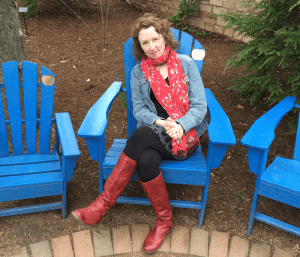Apply the Brakes and Write More!
September 28, 2021
Note From Rochelle
Dear Writers,
Today’s tip continues our series on writing productivity based on the book Organize Your Mind, Organize Your Life: Train Your Brain to Get More Done in Less Time by Paul Hammerness, M.D., Margaret Moore, and John Hane. The first two articles are available on the blog—you can find the links at the end of today’s article.
If you struggle with ADHD, consider booking a private consultation.
Happy writing,
Rochelle, the Write Now! Coach
Apply the Brakes and Write More
by Rochelle Melander
What it is
When we pursue a thought or an action that will take us off task, we purposefully PAUSE, put on the brakes, and turn back to the task.
What it looks like for writers
So after we’ve tamed the frenzy and focused on writing, we face another hurdle: getting off task.
Maybe it happens like this. You’re writing the great American novel set in the way back times. In the middle of an important scene, you wonder, “Did they have ice cream in the way back times?” Putting on the brakes would look like this: making a note in your document or a to-do list to check this later and then getting back to work. Yay you! You’ve put on the brakes!
But this is what usually happens. We think, “I’ll just look that up.” But when we click onto the browser, Facebook (or Twitter, or whatever) is open, and we get distracted by someone’s rant about something. Twenty minutes later we surface and think, “What was I looking up?”
How writers get distracted
Most writers I work with get distracted in one of these five ways:
*External distractions. The phone buzzes. The dog pukes. We think, “I should check Facebook!” Between texts and Twitter, barking dogs and noisy neighbors, it’s easy to let external distractions pull us away from our work.
*Unfinished tasks. In the middle of writing about our protagonist ‘s fight with her mother, we remember that we need to purchase a birthday gift for our own mom. We notice the stack of unpaid bills on our desk. We remember that we promised to call our best friend and didn’t. Although we’d like to keep writing, we feel like we have other things to attend to as well.
*New ideas. Ideas show up when we are busy writing. Unfortunately, these ideas do not respect our boundaries, so while we’re working on the novel, ideas for the nonfiction book or an article or a business plan pop up. Often the lure of a shiny new idea can take us away from the work we are doing right now.
*The “What if?” Siren. When we’re busy writing, we might get nagging worries like:
- What if this fact is wrong?
- What if there’s someone out there who thinks about this differently?
- What if someone’s already writing this story?
These “what if” worries lead us down the path of long Internet searches, trips to the library, revision plans, and more. Instead of writing forward, we’ve put ourselves back to square one: figuring it out.
*The “not good enough” phenomenon. This is the voice inside our head that doesn’t let us write two words before it shouts things like: “No one will buy this, your characters sound stale, you don’t have the right education to write a book.” We’re tempted to stop writing and check out books on how to better ourselves, look for writing conferences to attend, and perhaps even browse MFA programs.
How to apply the brakes
Acknowledge it. Accept that “applying the brakes” is a necessary step in the writing process. Instead of feeling like, “Oh crap, there I go again, wandering over to another great idea, I really suck, I’m a horrible writer!” —accept that distractions happen. Everyone gets pulled off task. It’s part of the job. It’s how we deal with these distractions that counts.
Pause. Before you jump headfirst into distraction, pause. Ask yourself, “Is this what I want to do right now?” If so, go for it. If not, ask yourself: “What’s my purpose now?”
If you’ve set aside the time to write, then your purpose is to write. It is not time to tackle your to-do list or watch Tik-Tok videos or shop for new masks.
Jot down your tasks, worries, and ideas in a notebook or document—and then go back to work.
Strengthen. Distractions never go away. If you have ADHD, it might be harder for you to pause and refocus, but you can do it. The more you practice pausing and putting on the brakes, the stronger you will get. It will be less and less hard to STOP and refocus.
Your turn: stop by the blog and let us know how you “put on the brakes.”
Previous articles
Article One: Tame the Frenzy
Article Two: How to Focus and Write
 Write Now! Coach Rochelle Melander is a certified professional coach who helps people write and publish books that transform lives. She specializes in helping people with ADHD overcome distraction and finish their writing projects. Rochelle is the author of 12 books, including Mightier Than the Sword: Rebels, Reformers, and Revolutionaries Who Changed the World through Writing and Level Up: Quests to Master Mindset, Overcome Procrastination and Increase Productivity. She’s the founder of Dream Keepers, a writing workshop that supports children and teens in finding their voice and sharing their stories. Sign up for her Write Now! Tips Ezine at https://www.writenowcoach.com. And visit her new blog that helps teachers use #kidlit in their classrooms at http://themightywriters.com/
Write Now! Coach Rochelle Melander is a certified professional coach who helps people write and publish books that transform lives. She specializes in helping people with ADHD overcome distraction and finish their writing projects. Rochelle is the author of 12 books, including Mightier Than the Sword: Rebels, Reformers, and Revolutionaries Who Changed the World through Writing and Level Up: Quests to Master Mindset, Overcome Procrastination and Increase Productivity. She’s the founder of Dream Keepers, a writing workshop that supports children and teens in finding their voice and sharing their stories. Sign up for her Write Now! Tips Ezine at https://www.writenowcoach.com. And visit her new blog that helps teachers use #kidlit in their classrooms at http://themightywriters.com/










I don’t think I’ve ever even considered “putting on the brakes.” Boy oh boy do I need to.